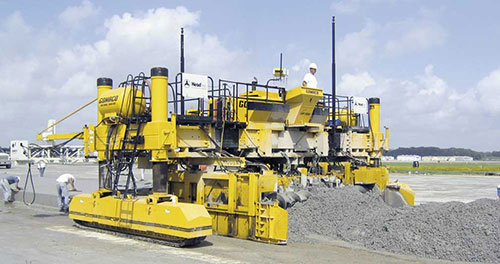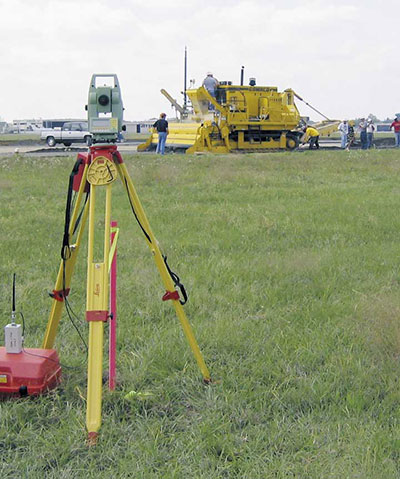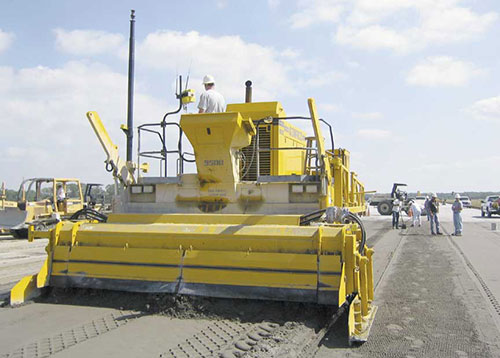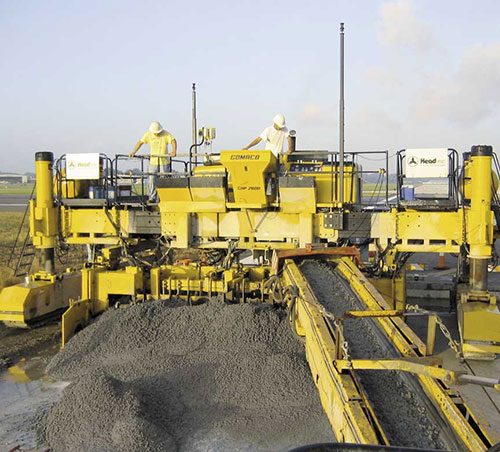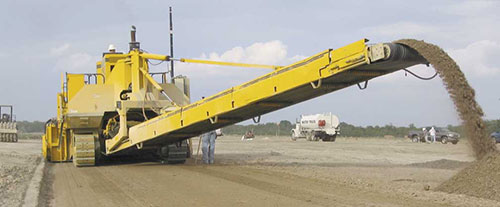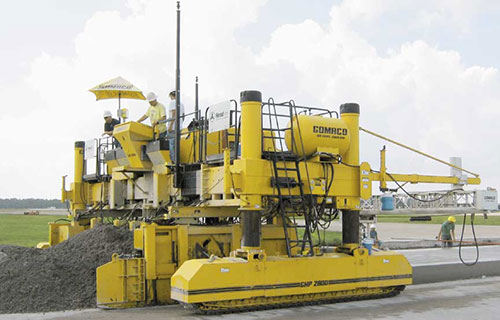GOMACO World Index --- GOMACO World 33.1 - February 2005
Quality And Innovation At The Baton Rouge Metropolitan Airport
Head Inc., based in Columbus, Ohio, works hard to maintain their competitive edge, not only in the field, but also with their people. Both office and field personnel are regularly sent to seminars, trade shows, and training events to make sure they stay on top of industry changes. When management was approached by the field personnel with the idea of stringless paving, management listened. They saw it as an opportunity to distance themselves from the competition and take a technological lead in their market share.
For the last 12 years, Head Inc. has specialized in airfield concrete slipform paving. Last year they added a new generation GHP-2800 to their fleet and have enjoyed the paver’s new features, including improved operator visibility and job-site mobility.
“We have the two-speed tracks on our paver and they make it easier and faster to maneuver around the job site,” Paul Ondera, vice president of Head Inc., said. “This new paver is more operator-friendly and has better visibility, particularly of the mud box. The dual-telescoping frame makes it easier to change the paving width. Plus, it’s much quieter and that’s a big help from the standpoint of the operator’s comfort and easier communication.”
They have the leading edge paver and they were intrigued by the stringless system and the advantages it offered. If they purchased a new stringless system, they wanted it to be able to work with both their GHP-2800 and 9500 trimmer/placer.
“Our field people became interested in stringless paving so we called GOMACO and Leica and sat down with them,” Ondera said. “We went through the process and we became convinced that it would work. Our field people saw it as something they could use to become more efficient. It was their idea, and the attitude about instituting this change was really good company wide.”
Head put their new system to work on the Baton Rouge Metropolitan Airport in Baton Rouge, Louisiana. They had 270 days to remove and replace 3760 feet (1146 m) of full-depth concrete runway.
The contract also required them to furnish and place a new six inch (152 mm) thick cement-treated base (CTB) course. Their 9500 was equipped with the stringless system and trimmed the base to its required depth.
“We have the system permanently set up on our trimmer and our paver,” Ondera explained. “Our project engineer and surveyor create a model of the job site from the project design data and that information is put into the system’s computer. That same model of the surface can be used for both the trimming of the CTB and paving the concrete.”
Management at Head Inc. was approached by their field personnel about the advantages of stringless paving. The Baton Rouge Metropolitan Airport was their first project with the new technology.
With the CTB in place and trimmed to the proper depth, the 9500 trimmer was switched over to a placer and the paving began.
The new runway is 150 feet (45.7 m) wide, 15 inches (381 mm) thick with a total of 66,000 yard2 (55,183 m2) of concrete paving.
The GHP-2800, outfitted with the Leica stringless system, was paving 18.75 feet (5.7 m) wide lanes. Front and rear slope sensors on the paver are used to measure the paver’s position and any cross slope in the slab. Prisms are also mounted to the paver and are used for tracking purposes for the total stations on the project. The project coordinates are loaded in the Leica computer, which is interfaced with the paver’s G21 control system.
Three total stations were at work on the project. Two are constantly taking shots at the prisms on the paver and relaying those measurements back to the Leica computer. The third total station is used to conduct as-built checks of the line and level of the new stretch of runway. It provides instant feedback on the accuracy of the new slab. The third total station is also used to leap frog the Leica system to keep up with the paving operation.
“There’s a certain comfort level built into setting stringline, because you have visual confirmation that your grades are right,” Ondera said. “The first stringless pour was scary. It took a lot of checking and rechecking for us to be fully convinced that the system was working correctly.”
That’s one of the advantages of the stringless system. The entire model of the project with the location and elevation of every point on the runway is contained on the Leica computer.
“You can go anywhere behind the paver and set the rod with a prism, shoot at it with the total station, and the computer calculates what the elevation is supposed to be just as soon as it locates the location of the prism,” Ondera said. “We can pave 10 feet (3 m) and go back and check 10,000 different points on that piece of pavement. It’s a tremendous advantage having the location and elevation of every point on the entire slab.”
Production on the project averaged 130 yard3 (99 m3) per hour. Lights in five of the eight paving lanes created an extra challenge on the project.
“We had center-line lights 24 inches (610 mm) out into one lane every 50 feet (15.2 m) all the way up and down,” Ondera said. “This project also had touchdown zone lights that were every 100 feet (30.5 m) and there were three touchdown zone lights on each side of the runway. We had to deal with lights in five out of our eight lanes. They were a major hassle.”
The light cans were fitted with plywood covers and set in place. The GHP-2800 paved over them and then finishers went back and hand-finished around the cans.
Concrete for the project was mixed by an on-site batch plant located just off the end of the new runway. Head used a mix design with a 650 flexural strength requirement with blast furnace slag added. Slump averaged .75 to one inch (19 to 25 mm).
“Our requirements on this project, and on most of the projects we work on, is .25 inch (6 mm) deviation on a sixteen foot (4.9 m) straight edge, and we easily accomplished that,” Ondera said. “Tolerance-wise, with the stringless system, we’re the same as we are on what we refer to as ‘good stringline.’ When you set stringline, if you set it well, if you set it right, and if you set it accurately, we can achieve plus or minus .125 inch (3 mm), and we’re able to get that with Leica.”
The system is well within the airport pavement tolerances and Head doesn’t have the hassle of setting up or dealing with stringline. The time savings alone has made it worthwhile and it offers other advantages and versatility, too.
“It takes a lot of time and effort to set stringline and that’s where the biggest savings are,” Ondera said. “We’re estimating a pretty rapid return on our investment. Plus, the options available to us without the stringline are a big factor.
“For example, if we were going to pave a lane of concrete, we would go out the day before and set string down both sides of the lane. If something happens like the grade is wrong or an electrician couldn’t get out of the way in time, we couldn’t pave that day. If something like that happens with the stringless system, we can just go pave something else. We don’t need the string because we have the model of the entire project inside the Leica computer and we can pave or trim anywhere. That gives us a lot of flexibility and that’s a big plus.”
Head Inc. successfully completed the Baton Rouge airport well within their allotted time frame. Since then, they’ve moved on to their next airfield project and are excited about their new technology, both their new generation paver and the stringless system. The company is looking at purchasing another stringless system and adding some additional field personnel.
“We’re sold on GOMACO equipment,” Ondera said. “The support that we get from them has always been outstanding and they have quality equipment.
“We’re very interested in being out there on the front edge and we’re really excited about this equipment. We’re not a huge company, but we have some really good people and that’s the key to the whole thing. You have to have quality people and we’re always looking for them.”
Subscribe to Receive GOMACO World Magazine
